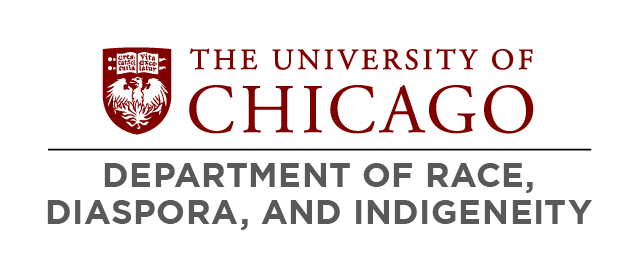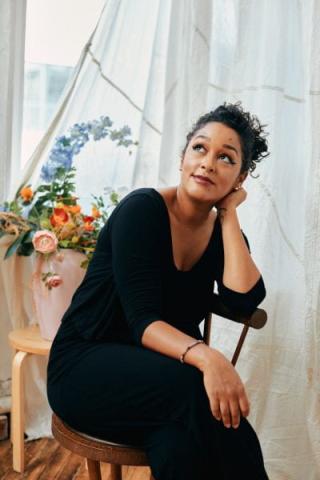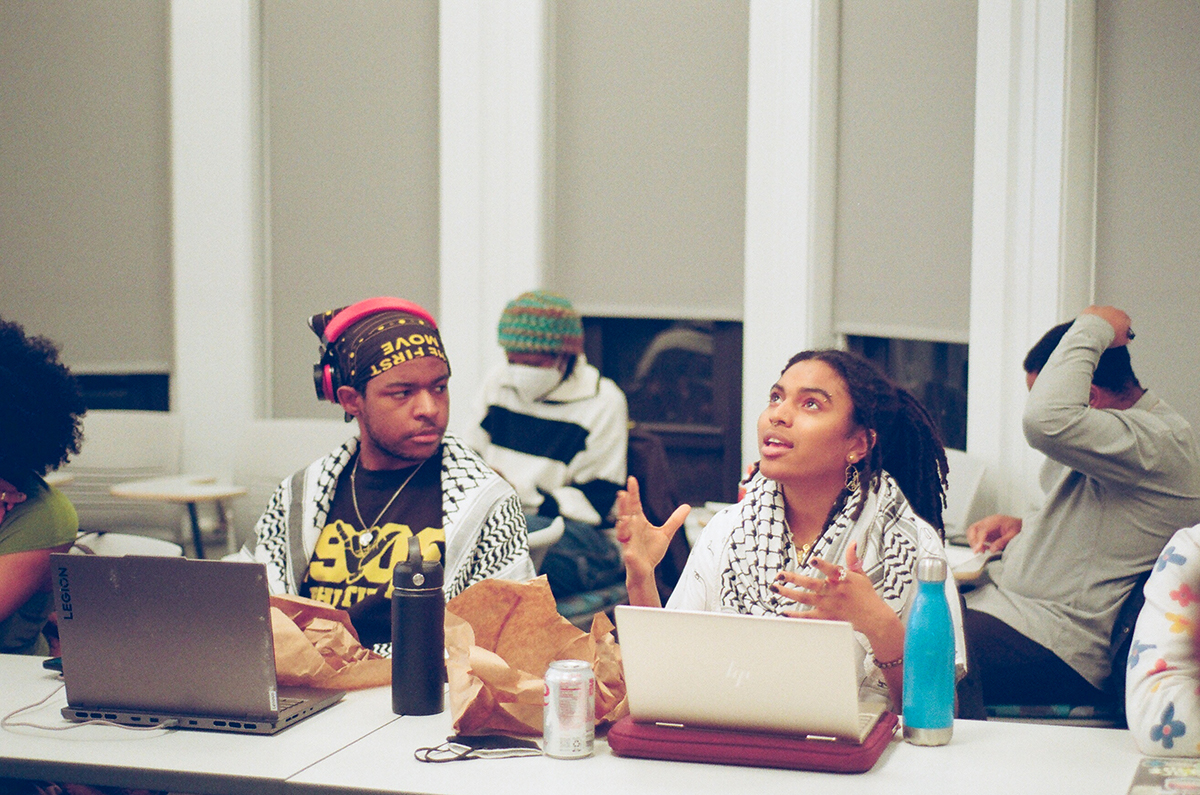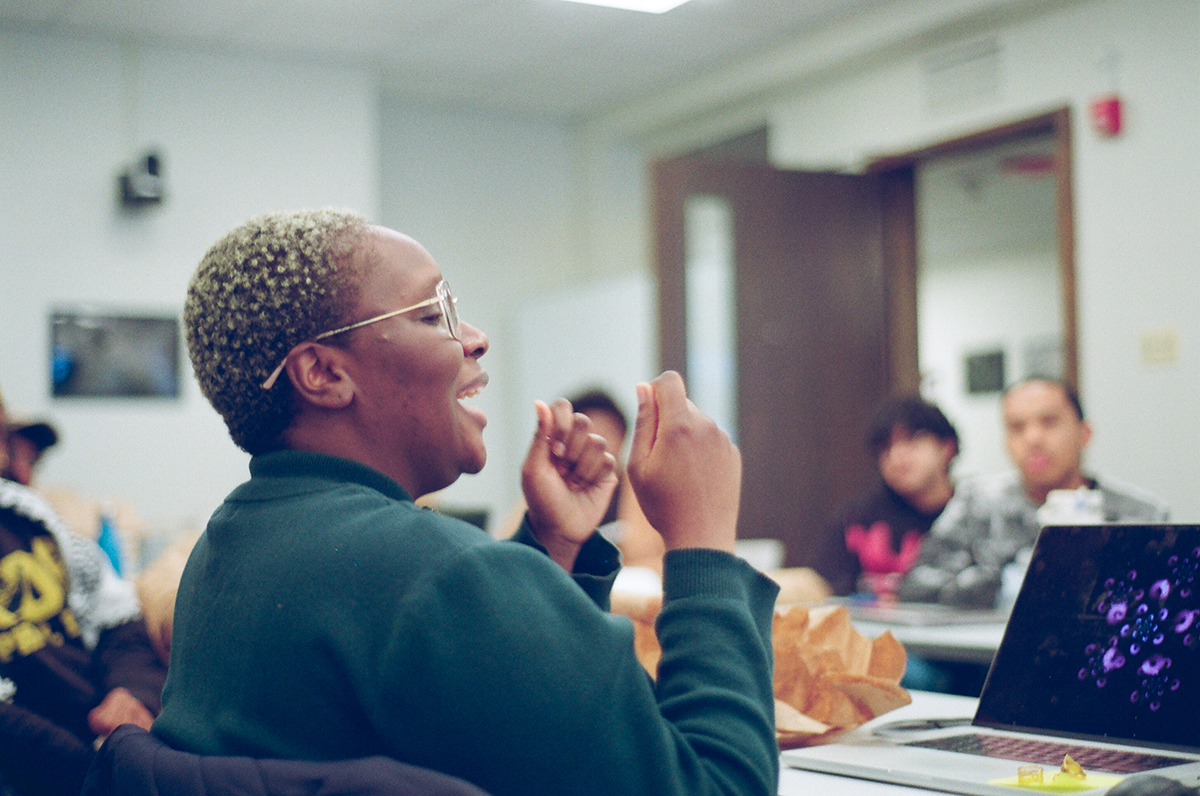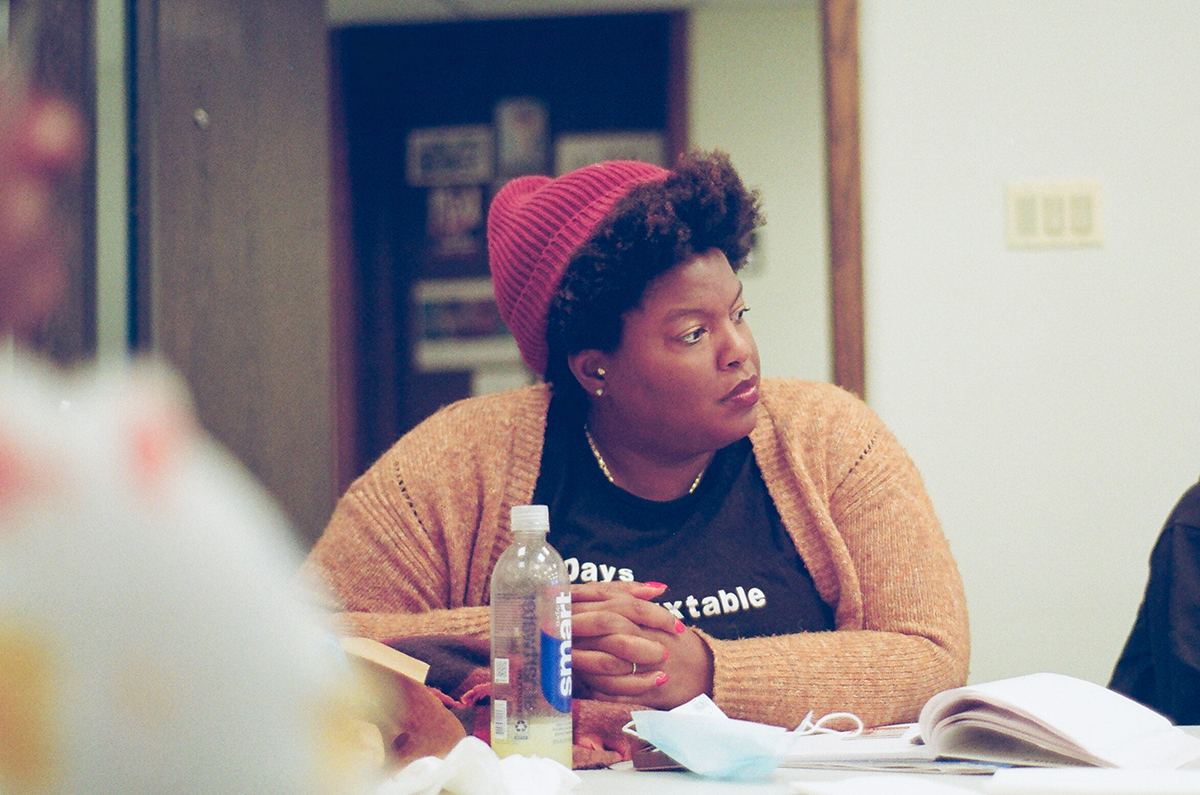A community-engaged format brought the learning environment to life in Professor Ewing’s Afrofuturism(s) course
The course brought enrolled Uchicago students and community members together as they explored the dynamic genre.
By Sarah Steimer
Afrofuturism is a blending of many genres, beliefs, and histories. As described by Chicago’s own Ytasha L. Womack, author of Afrofuturism: The World of Black Sci-Fi and Fantasy Culture, it is both an artistic aesthetic and a framework for critical theory, bringing in “elements of science fiction, historical fiction, speculative fiction, fantasy, Afrocentricity, and magic realism with non-Western beliefs."
It would stand to reason, then, that a course on the topic would also be a medley, pulling in literature, music, and other art forms. Such a class would critique and debate Afrofuturism, experience it and make it.
But UChicago’s Winter Quarter 2023 course, “Afrofuturism(s),” took the blending of elements one step further: The undergraduates in the class explored the topic alongside a group of students from outside the university, from the greater Chicago community.
“I realized that what makes this course so radical — to me — is the way it challenges every aspect of my educational experience,” one student wrote in an anonymous evaluation. “More than ever, it feels like education is becoming siloed and very individualistic. … This class said, what does learning look like when we invite our community to be a part of the learning process? … It means deeper and richer conversations in which life experiences are taken to be as important and valuable as theoretical arguments or academic lexicon.”
Afrofuturism has been a core theme of Eve L. Ewing’s work for many years. Ewing, Associate Professor in the Department of Race, Diaspora, and Indigeneity (RDI), underscores the city of Chicago’s particularly rich influence on Afrofuturism: In addition to Womack, Chicago also boasts poet and artist Krista Franklin and musician Sun Ra.
In deciding to teach a course on the topic, Ewing noted that Afrofuturism is an area where there remains a lot of debate and discussion about what it is and what it is not. Exploring the dynamics of Afrofuturism could offer a model for thinking about other intellectual frameworks or modes of thought, be it Marxism or feminism or otherwise, she says.
“That kind of intellectual engagement with ideas being in flux and open to collective debate and definitions is something I was hoping students would get out of this class,” Ewing says.
And that collective debate would include a broader set of voices, because the community aspect of the course went beyond just the city of Chicago’s cultural influence on Afrofuturism, but community members themselves were invited to apply to take the class alongside UChicago students.
“Part of what I'm calling for is to have a little bit of a blurrier understanding of what that inside-outside dichotomy even means,” Ewing says, referring to the enrolled students and community members. “That's something that I've been interested in for a long time and something that RDI as a department is interested in.”
“Afrofuturism(s)” was the second course in the department to bring together UChicago students and members of the community. Previously, Cathy Cohen, the David and Mary Winton Green Distinguished Service Professor at the University of Chicago, and Alice Kim, Director of Practice in the Center for the Study of Race, Politics and Culture, offered a course to both UChicago students and those incarcerated at Stateville Correctional Center.
Ewing says Afrofuturism was an ideal topic for a community-engaged course because the readings, films, and other media are so engaging and appealing to a very broad audience. It’s also an area, she said, where knowledge could be a bit more democratized; there were people in the class with a high level of familiarity of Afrofuturism, and those with less — regardless of whether they were UChicago students or community members.
“The readings have been wonderful,” says quilting activist Dorothy Burge, a community member in the class and. “We have also seen some incredible films, which I have really been inspired by. Some of the music that I have listened to for years — to have it connected to Afrofuturism has really been an incredible experience for me”
The department received more than 70 applications from community members, and those chosen included “an amazing diversity of people,” Ewing says. Most came from around the South Side of the city; some work in the nonprofit sector, one person works in theater, another clears tables at a restaurant, and yet another works as a full-time hairdresser.
With nontraditional students come nontraditional challenges, which the department was careful to help manage so each member of the class could be an active and engaged participant. Because of work schedules, the class took place in the evening, with a meal provided. And everyone received the technology and building access that an enrolled student would have baked into their university experience.
The course opened with a basic question of, “What is Afrofuturism?” This first week included the introduction of the text Afrofuturism: A History of Black Futures, along with a reading of Mark Dery’s “Black to the Future” article that features three Black cultural critics and thinkers. The following week explored individuals often considered Afrofuturists who were working before the term was used, which included reading W.E.B. Du Bois’ short story “The Comet.”
The class then leaned into debate and critique: They read Nnedi Okorafor’s work, an author who vehemently insists she is not an Afrofuturist despite being widely described that way by cultural critics. They also considered Roland Barthes’s idea of the “death of the author” in which the writer does not get to decide how their work is perceived by the public. They moved into thinking about the role of outer space as an image in Afrofuturism and watched Sun Ra’s film Space Is the Place, and read critical writing on his work.
The course included excursions as well: After reading and discussing themes of utopia and dystopia by way of Octavia Butler's Parable of the Sower, the class took a field trip to the Hyde Park Art Center to see “The Alien-Nations and Sovereign States of Octavia E. Butler.” The exhibit was created by Chicago‐based artist Candace Hunter, who gave an artist's talk and answered students’ questions.
There was a public listening event featuring music from Sun Ra, Janelle Monae, and Parliament Funkadelic with the support of the Richard and Mary L. Gray Center for Arts and Inquiry, which included a conversation with Ytasha Womack and music historian Duane Powell.
Over the course of the quarter, the students worked on a collaborative Afrofuturist zine — a D.I.Y., self-published work they presented in a media showcase at the end of the course. The students’ zine included short films, poetry, fiction, sociological critical analysis, music composition, and a curated art collection. “For a lot of students, it was an exciting opportunity to explore different modalities of how they engage with the things that they're reading and watching and listening to and talking about,” Ewing says.
And — as hoped — the exploration of different ideas went beyond the class content.
“I really just wanted to engage with the community outside of the school,” says Elijah Jenkins, a UChicago sophomore. “A lot of times, in normal classes, we are talking about applications, but don’t really get to connect with the real world. When the RDI department was offering a mixed enrollment class, it offered an opportunity to connect with people who have jobs and lives besides studying, and (for) seeing what their purpose was for learning the information as well.”
Ewing says intergenerational relationships formed within the class, with students asking the community members for their advice and opinions. She says the conversations that occurred before and after class, or during meals, were more valuable than she could have anticipated. Since her time as a middle school teacher, Ewing says her understanding of what it means to build a classroom has been connected to ideas of community and how to use the classroom as a space to experiment with what is possible when people interact.
“Every single person in that class brought thoughtful, generous, rigorous, incisive, critical perspectives that helped us build a meaningful learning community,” she says. “If what we want is to provide University of Chicago students with the most cutting edge, innovative, insightful learning, there are people with wisdom, people with things to say throughout our city — and they're coming from many different communities and bringing so many different forms of knowledge.”
In addition to the students — both enrolled and community members — who came together to build a thoughtful classroom, Ewing is also sure to acknowledge the staff and graduate students who also helped: The course was co-designed with former UChicago student Samuela Mouzaoir. English Ph.D. student Misha McDaniel was the class’ teaching assistant. Danielle McConnell, the UChicago Library’s Director of Community Engagement, set up archives, resources, and databases for the class and provided instruction for their use. Jacqueline Gaines, RDI’s Student Affairs Administrator, coordinated everything from meals to wifi to building access.
 THE UNIVERSITY OF CHICAGO
THE UNIVERSITY OF CHICAGO

